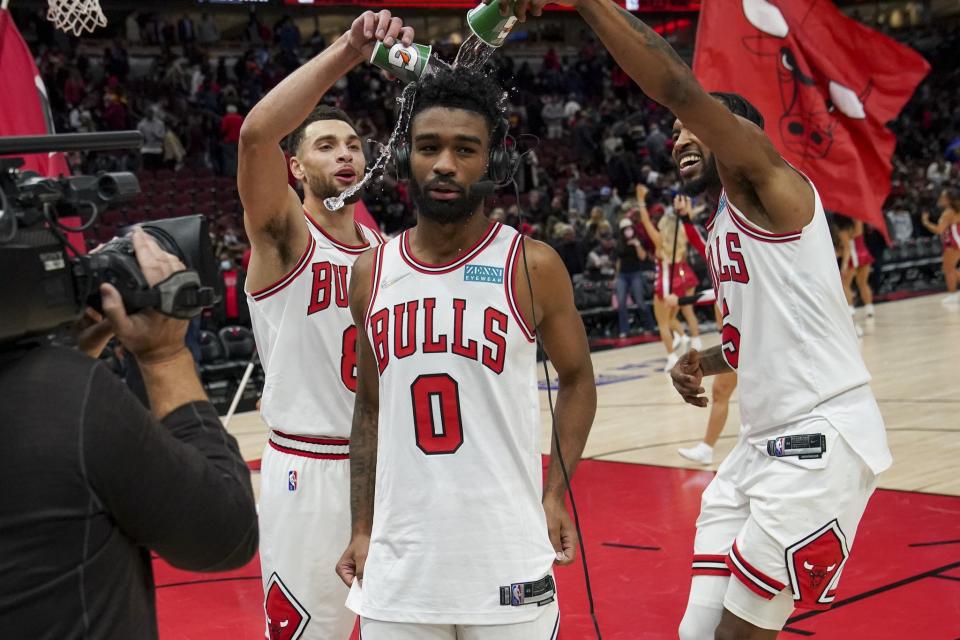Chicago Bulls’ COVID-19 woes show the staying power of the disease — but experts ‘optimistic’ that vaccine boosters will help

Dr. Elizabeth McNally is a Chicago Bulls season ticket holder as well as a COVID-19 researcher at Northwestern University, and she has watched with dismay as the virus has torn through the team, sending seven players to the inactive list.
She is hopeful, though, that the worst may soon be behind them.
“I run a big research study where we look at (immune) response after getting COVID or a vaccine,” she said. “We’re incredibly encouraged by the response after boosters. … I’m really optimistic that the boosters will carry (the Bulls) through the rest of the season.”
The Bulls are fully vaccinated, according to team officials, but experts say their misfortune with the virus carries lessons, both cautionary and promising, for the rest of us.
The first is that breakthrough infections are not just a theoretical concern for people who are vaccinated. ESPN reported last month that the NBA was aware of 34 infections among fully vaccinated players and staff members, and that number has increased with later rounds of positive tests.
The findings prompted the league to encourage its personnel to get booster shots. It has reportedly set a Dec. 17 deadline for players to either get the extra shot or submit to daily COVID testing.
The second lesson is that the choice of vaccine matters — to a point.
The Bulls said in the spring that their players received the Pfizer vaccine, but much of that roster has since been replaced. Other players in the league reportedly got the single-shot Johnson & Johnson vaccine, which has not shown the same level of protection as the two-shot regimen of mRNA-based vaccines.
The Bulls haven’t said which vaccines were taken by the players who are on the inactive list. But Johnson & Johnson has reported that a booster will take the effectiveness of its vaccine to 94%, roughly the same as that of Moderna and Pfizer.
All the vaccines have been shown to cut down on the severity of illness should a breakthrough infection occur. After Bulls center Nikola Vučević fell ill in November, he compared his symptoms to those of a cold.
That said, boosters do not offer not ironclad protection. Memphis Grizzles guard Ja Morant reportedly received a booster shot but was still placed into the league’s COVID-19 health and safety protocols, reserved for players suspected of having contracted the virus.
Players who end up there must isolate for at least 10 days, though they can return earlier if they produce two negative tests within 24 hours. That’s how Los Angeles Lakers star LeBron James was able to come back after missing just one game following a test later determined to be a false positive.
McNally said players who have gotten booster shots should be able to rapidly clear their systems of the virus.
“Boosters dramatically suppress (serious illness),” she said. “They just can’t turn transmission to zero. That’s not what they’re designed to do.”
A third lesson is that discerning how infections occur is still difficult. The Bulls have not said how they believe their players contracted the virus, and Dr. Michael Lin, an infectious disease specialist at Rush University Medical Center, said there are still no good data about which sports are more likely to see transmission.
Logic dictates that indoor sports and those featuring close contact are riskier, he said, but that’s not the entire story.
“A lot of the transmission isn’t necessarily happening in the field of play,” he said. “There are other factors related to the locker room or socialization during or after games.”
Indeed, some outbreaks among sports teams have been tied to activities away from practice or competition. A community college baseball team in southern Illinois saw more than half of its players contract the virus last year, but school officials said that appeared to be tied to their housing, not activities on the field.
The Bulls’ COVID toll could also be due in part to the rigor of their testing routine. The team reinstated daily testing recently after Coby White registered a positive test, and since then six others — DeMar DeRozan, Javonte Green, Matt Thomas, Derrick Jones Jr., Ayo Dosunmu and Stanley Johnson — have joined him in the league’s health and safety protocols.
The Chicago Bears, by contrast, have only one player, offensive lineman Elijah Wilkinson, on the list reserved for players who test positive for COVID or were in close contact with an infected person (league rules do not allow for greater specificity, a team spokesman said).
The NFL tests vaccinated players once a week, according to protocols it crafted with the players’ union, while the NHL tests every 72 hours. Not long after their season began in October, the Blackhawks had six players and two coaches in the league’s COVID protocol, but all are back now.
The final lesson of the Bulls’ COVID experience has yet to be taught, and that is how the still-emerging omicron variant will affect the team and the nation.
The Bulls haven’t said which strain of the virus their players contracted, and for all the concern over the new, apparently fast-spreading mutation, only a few dozen cases have been identified within the U.S. But Lin said that could change quickly.
“The one thing that’s unknown is whether the omicron variant will become more prevalent in the U.S.,” he said. “If so, that might reduce the efficacy of the vaccine, but generally it’s much better to be boosted than not.”
Tribune reporter Phil Thompson contributed.

